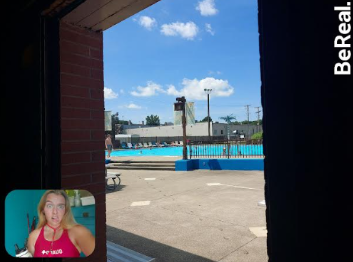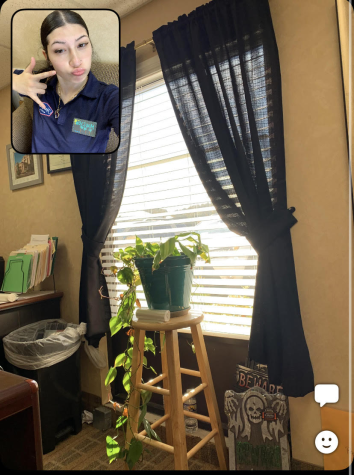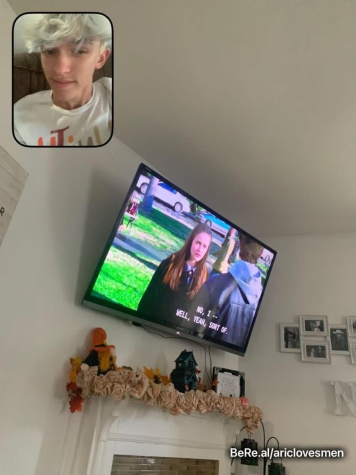Being Real on Social Media
Viral app reveals realistic sides of users

One of Spurling’s BeReal posts. Photo courtesy of Spurling.
February 14, 2023
BeReal, the social media app based in Paris and founded in 2020 is trending among college and high school students. According to The New York Times, BeReal has been installed nearly eight million times (Herrman 2022).
The way BeReal works is that a notification goes off on a user’s phone at a random time once per day. The app allows two minutes for the user to take a photo with the front camera and a photo with the back camera. There are no filters and no editing the pictures.
The whole point of BeReal is to show what someone is doing in the moment, as opposed to an app like Instagram where pictures are planned and chosen with thought. On most social media apps, there are filters, editing, and people show only the lavish parts of life on social media. It is easy to forget that in real, face-to-face, life there is no editing, no filters, and there are both good and messy parts.
There is a fine line between the social media world and the real world that can easily be misconstrued; BeReal crosses that line and creates a more accurate depiction of what people are doing on a day-to-day basis. Sherry Turkle, a psychologist and professor from The Chicago School of Professional Psychology, said that sometimes people don’t appear on social media as they really are.
“We think we will be presenting ourselves, but our profile ends up as somebody else—often the fantasy of who we want to be” (The Chicago School). BeReal is more about showing what people are actually like and less about their online persona.
Teenagers are certainly no exception to the confusion of online life and real life. Madison Shafer, an LHS senior and user of BeReal, compares herself to others on social media.
“Sometimes I’ll see photos of other teenagers on Instagram, and it always just seems like they’re going on more vacations, they’re going out more, and they’re having more fun than me and it makes me wonder ‘What am I doing wrong?” Shafer stated.
Jessie Spurling, another LHS senior and BeReal user, weighed in on the comparisons caused by social media.
“Other forms of social media, due to the constant publishing of positive posts, causes other users to believe their lives are terrible in comparison, leaving a negative mental effect on the other users,” said Spurling.
When social media users scroll through various apps they subconsciously compare themselves to what they think are perfect people. Donna Wick, a Doctor of Education, described the effect that social media has on one’s self-image.
“Social media makes it harder to accept the less-than-perfect being you really are” (childmind.org).

Through BeReal, people see that maybe their lives aren’t so different from everyone else’s after all. Shafer explained that she likes BeReal because it depicts a more realistic image of people’s daily lives.
“You really start to see the boring parts of people’s lives that are more realistic than the idea that people go out and have fun every single night. Instead, you see them lying in bed watching movies, or doing homework, or just hanging around their house on their phone. Sometimes life is boring, and that’s okay,” Shafer stated.
Not only do people on social media compare their lives to what they see on social media, but they also compare their faces and bodies. LHS sophomore and user of BeReal, Aric Gee, gave his own input on the negative sides of social media.
“I feel like social media has a negative effect on people because of all the drama and people not feeling comfortable in their own skin,” he said. “BeReal is giving people the opportunity to go filterless and have people think they don’t really need a filter to make them look pretty…[or] look like other girls or guys.”
BeReal users also like the fact that they can see what their friends are doing in a specific time period because knowing what their friends are up to creates a connection between them. Spurling said that she uses BeReal to keep up with what her friends are doing every day.
“What I like about BeReal is that I can see what my friends are doing at that exact moment in time. By seeing this, I can interact with my friends. For example, the next day at school I can say ‘Oh hey Noah, I saw that you were at the baseball game! That’s so cool.’ BeReal is a conversation starter and a great way to connect,” Spurling stated.
Shafer sees BeReal as a more fun way to show what activities people do each day.
“I personally think seeing a photo of what your friends are doing is more fun than if you were to just ask and they tell you,” Shafer stated.
With the many other social media apps that someone could use, one may wonder why BeReal was created. Spurling explained why she believes the app was created.
“I think it BeReal was made to create a platform where you are not being drowned out by influencers posting 400 times a day about how their lives are amazing. It is an app where people can post whatever they are doing (whether it is positive or negative), once a day, and connect with their friends by doing so.”
Gee described why someone may prefer BeReal to other social media apps.

“Other apps such as Instagram and TikTok are like a bad influence on people because of cyberbullying and harassment but BeReal you don’t get that as much as other social media platforms and BeReal is where you can’t edit your pictures so you can’t fix what you think is making you not beautiful or handsome.”
BeReal manages to defy the illusion that everyone looks perfect and put together 24/7; Spurling pointed out the difference between BeReal and other apps.
“I believe that other social media apps like Twitter, and Instagram, users post only what they want to post. Users of these apps post only the ‘higher’ or ‘greater’ points in their lives if you will. BeReal, however, due to the set time to post, users post the good, the bad, and the ugly of what is going on in their lives,” she said.
Shafer also described the differences between BeReal and other apps.
“On Instagram, people are posing, they have makeup on, and they’re using angles and that’s fine; but it isn’t realistic. I know I look bad sometimes, but if I were to pose and put makeup on and post it on Instagram, I would look a lot better. With BeReal, you can’t do that and I think that’s cool.”

